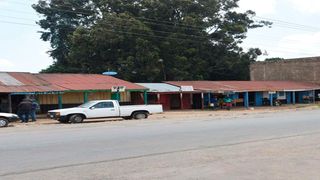Breaking News: Old Kijabe dam tragedy: Death toll rises to 45

Part of Kabartonjo town in Baringo County on 18 July 18, 2023. The town, which was founded by missionaries in the 1930s, remains undeveloped with many buildings.
| Jared Nyataya | Nation Media GroupBaringo
Premium
Why the sleepy Kabartonjo town remains undeveloped years on
To some locals, Kabartonjo town is famously known as “London”. Others call it “Kap mesien”—the missionaries’ place.
The town, which is the headquarters of Baringo North sub-county, was started by missionaries in the early 1920s. It also has a close relationship with former President Daniel Moi, who schooled at the Africa Inland Mission School. The school was located in present-day African Inland Church Kabartonjo.
It is also home to prominent elites such as former provincial commissioner Samuel Limo, General (Rtd) Daudi Tonje, Prof Japhet Kiptoon and former Moi aide John Lokorio.
Despite this rich history, Kabartonjo remains a sleepy town, stark contrast to its nickname.
Aged and dilapidated temporary structures welcome you to the town—locals claim most of them were constructed in the 1960s. There are a few modern buildings along the tarmac, but they are not new having been built in the mid-1980s.
Government officers working in the locality face a major challenge in finding appropriate housing units. This has forced most of them to commute from the neighbouring Kabarnet town, 19 kilometres away.
Mr Stanley Kipkechem, a local trader, has lived in the town for the last four decades and tells the Nation that he found most of the buildings in the town when he settled there in the 1970s.
“Since I settled in this town more than four decades ago, the structures remain the same,” he says. “In 1985, the first one-storey building was constructed in the town.” He says locals were baffled by the new structure
“Every morning they would mill around as the construction works happened. It was part of history for some of us to see the first storey house being constructed,” said Mr Kipkechem.
A few more storey buildings came up a few years after, including one put up by former Baringo County Council chairman Joel Bultut. Not much has changed since, Mr Kipkechem says.
According to him, the main reason is that elders did not surrender their land to their children early enough for development.
“This town has failed to develop like other major towns in this county because most of the landowners who started it are old men from the Sowe and Chumo age set who never wanted their land to be sold. To them, owning huge chunks of land was an honour and prestigious, and they held back from surrendering it to their sons fearing they would sell it,” says Mr Kipkechem. “This town will not grow unless the tenants, who are very old now, pass the mantle to their children.”
Mr Erick Bett, a former Kenya Postal Corporation director who is from the area, says that major political decisions by the community were made there.
“This town ... has been the cradle of politics in Rift Valley since pre-independence because this is where serious decisions affecting the Kalenjin community were decided. Most leaders like Taita Towett, whenever they wanted to address the community on serious issues, always came to Kabartonjo and it remains a hotbed for politics to date,” he says.
According to Mr Bett, the area was all forest before the missionaries started a small shopping centre. Some old men were given plots to put up shops, which were built along the road and stand to date. Successive governments have never expanded the town, apart from the late Moi who hived part of the forest and built Kabartonjo Sub-County Hospital and Moi High School Kabartonjo.
“When he (Moi) became the President, he toured the area and promised to put up a landmark church. He did it personally. We did not hold any fund-raiser and he used to come almost twice a month to inspect the project by himself,” Mr Bett explains. “He put up an ultra-modern church with a capacity of more than 3,000 people. The church is now a landmark for this town.”
Mr Bett confirms the narrative that old landowners’ resistance has held back the town, but also blames poor physical planning by successive governments. He further reveals that there has been an appeal over the years to hive off a section of Katimok forest to expand Kabartonjo town.
The recent construction of Kapchepkor Training Institute, a few kilometres away, is expected to spur development in the town.
Baringo North Sub-County administrator Hellen Juma is concerned by the resistance by landowners to release their properties for development.
“There is a lot of land stretching to the town but no one is willing to sell it for expansion,” she says. She reveals that some senior citizens, some who have since died, placed caution on their land so their children cannot sell it.
“There is also resistance to the demolition of the old structures to pave the way for construction of new buildings and so we remain stuck,” she states.





